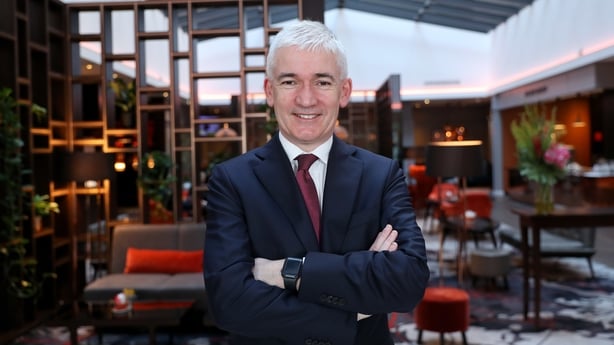Dalata Hotel Group has reported profit after tax of €46.7m for the first half of the year.
This marked a significant improvement on the loss of €30.4m reported the same time last year when there were widespread closures across the sector due to Covid-19.
Dalata, which owns the Maldron and Clayton hotel chains, said its revenue for the six months to the end of June came in at just over €220m from €39.6m the same time last year.
Revenue for the first half of this year also surpassed the levels achieved in first half of 2019 - pre-Covid - by 9%, on the back of the expansion of its portfolio.
The hotel chain said its occupancy rate stood just below 70% with an average room rate of €126.89 during the six month period, up from €81.99 in 2021 and €110.30 in 2019.
Dalata said its Revenue Per Available Room (RevPAR) jumped to €88.61 from €16.28 the same time last year. It also marked an increase on the rate of €88.48 in 2019.
The hotel group said that demand has largely returned across all segments led by very strong leisure demand particularly around event dates and weekends.
It also said its corporate business returned though the mix and profile was slightly more skewed towards non-international corporates as most US multinational corporates have not yet returned to pre-pandemic travel levels.
The supply of hotel rooms in Ireland is also temporarily reduced as a significant number of rooms are currently being utilised by the Government to accommodate refugees, notably those fleeing the war in Ukraine, it added.
Dalata's group chief executive Dermot Crowley said the first half of 2022 was a period of strong recovery after the lifting of Covid related restrictions at the end of January.
We need your consent to load this rte-player contentWe use rte-player to manage extra content that can set cookies on your device and collect data about your activity. Please review their details and accept them to load the content.Manage Preferences
"The year to date has also been very busy on the development front with the addition of six hotels (1,600 rooms) across four cities. This includes our first exciting step into continental Europe as we entered the lease for Hotel Nikko Düsseldorf," the CEO said.
"Despite a challenging start to the year, we delivered revenues of €220.2m for the period, exceeding the levels achieved in the first half of 2019," he stated.

"Over the last two years, financial stability has been a key focus for our team. I am especially happy to report that our balance sheet has significantly strengthened since the start of the year which ensures we have the capability to exploit opportunities to expand the portfolio further," he added.
Dalata said it received wage subsidies from the Government amounting to €10.5m during the first six months of the year in the form of the Employment Wage Subsidy Scheme (EWSS).
The EWSS was available to employers who suffered significant reductions in turnover as a result of the Covid-19 restrictions.
The group availed of the EWSS scheme from January 2022 to May 22, 2022, at which point the scheme ended.
Dalata said its Dublin RevPAR rose to €104.49 from €14.31 the same time last year, while occupancy increased to 75% from 19.1%.
RevPAR at its Regional Ireland portfolio rose to €79.57 from €21.65, with occupancy levels up to 68% from 23.9%.
Meanwhile, RevPAR at its UK hotels came in at £68.05 from £15.54 last year as occupancy levels rose to 68.3% from 21.2%.
Energy pricing is a concern
Dalata CEO Dermot Crowley told Morning Ireland that the recovery since the start of the year had surprised on the upside.
He said occupancy rates - which stood on average at 70% for the half year - improved as the period went on with "very positive" momentum from May onwards.
On hotel pricing and allegations of price gouging across the sector generally, Mr Crowley said he could only comment on his own group's pricing and he cited Dalata's average room rate in Dublin of €166 for the May to August period.
"For a four-star hotel in Dublin, that's a reasonable rate to be charging. We took a responsible approach to pricing," he said.
"We're not doing anything to damage the tourism industry in Ireland," he said.
On the 9% VAT rate on tourism related activities, which was re-introduced during the pandemic, Mr Crowley said it had been very helpful and was comparable to rates that were levied across other European countries.
Dermot Crowley said energy pricing was a particular challenge to the outlook for the rest of the year and next year.
"Our energy bills in the first half went from €5m at the same time in 2019 to €13m," he explained.
"More worryingly, when we look at current pricing and what we've locked in, that's likely to rise by another €8m to €21m for the second half. That's a big concern," he added.
Shares in the company were lower in Dublin trade today.

